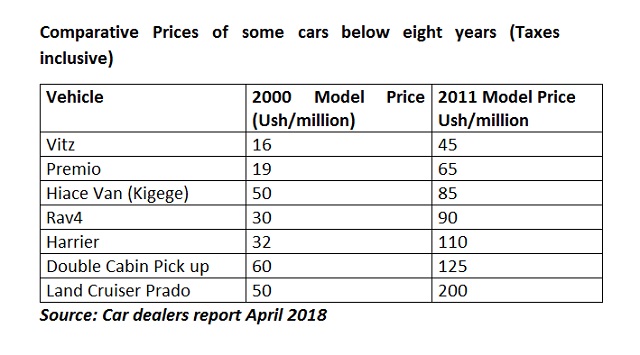
Chris Ntogota, who owns four used but posh Vintage cars (with manufacturing dates; 1962, 1964, 1965 and 1967) told The Independent that old cars are not bad for as long as they are repaired and serviced on time.
He also said that government should reduce taxes on newer cars so as to make them affordable for majority of the population to put on the road. Currently, majority of the cars imported in Uganda pay over 50% of the price of the car quoted by the seller as tax.
Enter car importers
In a joint statement issued on April 19, seven associations of car importers and dealers in Uganda, said they are not against government’s amendment bill but say it needs to assess the implications of the new move which among other things will see it [government] lose Shs180illion in annual taxes.
In addition, they said that implementation of the planned amendments will render over 11, 000 direct beneficiaries in the industry jobless.
In addition, it will also negatively affect other service providers such as restaurants, security firms, fuel stations, insurance companies, banks and tourism due to industrial downturn.
The car dealers said the government needs to put in place well organised and scheduled buses, trains, which will help reduce on the need for importation of used cars.
They also added that improvement of the rural infrastructure will enable longevity and less maintenance of newer cars making them a value buy. “Government should speed up implementation of the already on-going initiatives towards efficient transport systems,” they said.
Minister defends proposals
Works and Transport Minister, Monica Azuba, says vehicles meant for transport of goods with a gross weight of at least six tonnes and special purpose vehicles would be excluded from the new arrangement.
Special purpose vehicles in this case are breakdown lorries, crane lorries, fire fighting vehicles, spraying vehicles, mobile workshops, forklifts, mobile drilling rigs, works trucks, tanks, armored fighting vehicles, cesspool emptiers, water bowsers, bullion spreaders, bucket trucks, aircraft refuellers and mobile banks. Others exempted are agricultural or forestry tractors, earth moving vehicles, road rollers, tamping machines.
The bill proposes that all vehicles that will arrive in the country by September 30, regardless of the year of manufacture, will not be affected by the new law if it is passed.
According to Azuba, the bill is meant to amend The Traffic and Road Safety 1998 Act to increase motor vehicle registration fees and put an environmental levy on some vehicles.
Registration fees for a number of vehicles entering the country currently average at around Shs1.2 million at the moment, according to Ian Rumanyika, the Uganda Revenue Authority manager for public and corporate affairs.
But under the proposed amendments, for instance, sedans, saloons and estate cars will be required to pay Shs1.5million. The same amount will apply to omnibuses with a seating capacity not exceeding 28 passengers. Dual purpose goods and passenger vehicles will not be affected.
Estate and station wagon vehicles with engine capacities of 3500 cc and above would also pay Shs1.7 million for their registration.
 The Independent Uganda: You get the Truth we Pay the Price
The Independent Uganda: You get the Truth we Pay the Price




Nicely written blog as it si quite helpful and informative